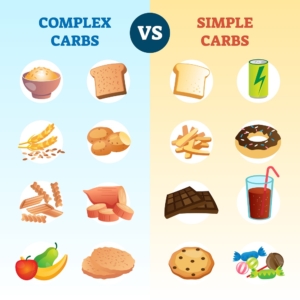Welcome back to our Nutrition Bites blog! This week, we want to talk about carbohydrates, which often get a bad reputation even though certain types are really helpful to the body, providing it with the energy it needs to function properly.
 Did you know that carbohydrates contain 4 calories per gram and are used in the human body as its preferred source of energy? They also come in the forms of simple and complex. Complex carbohydrates enter the blood stream slowly and provide long term energy, while simple carbohydrates enter the blood stream quickly and provide fast/short-term energy. Examples of complex carbohydrates include: sweet potatoes, brown rice, whole grains, oats and quinoa. Examples of simple carbohydrates include: candy, soft drinks, fruit juices made from concentrate, table sugar and corn syrup. Complex carbohydrates tend to be healthier for you overall and are needed for your daily nutrition. So, no, not all carbs need to be shunned at the dinner table.
Did you know that carbohydrates contain 4 calories per gram and are used in the human body as its preferred source of energy? They also come in the forms of simple and complex. Complex carbohydrates enter the blood stream slowly and provide long term energy, while simple carbohydrates enter the blood stream quickly and provide fast/short-term energy. Examples of complex carbohydrates include: sweet potatoes, brown rice, whole grains, oats and quinoa. Examples of simple carbohydrates include: candy, soft drinks, fruit juices made from concentrate, table sugar and corn syrup. Complex carbohydrates tend to be healthier for you overall and are needed for your daily nutrition. So, no, not all carbs need to be shunned at the dinner table.
Most carbohydrates that we ingest are broken down into glucose and then enter the bloodstream. While most people worry about consuming too many carbohydrates, there actually is a danger to not eating enough carbs. When glucose from carbohydrates is lacking, muscles will be broken down and used as an alternative source of energy. This can create a danger to the body because muscles are used for everyday movement. A severe loss of muscle mass can lead to poor health and even potential death.
 But how many carbs should an individual consume? The answer is not clear cut. Daily carbohydrate intake is critical to overall health but will vary based on an individual’s age, body composition, activity levels and metabolic health. A simple rule to follow is to time the bulk of your carbohydrate intake around workouts. If not working out, time carbohydrate intake for earlier in the day and avoid the nighttime hours. For general health, unless otherwise specified by a doctor, try to maintain a daily carbohydrate intake of at least 80 grams and ideally higher per day.
But how many carbs should an individual consume? The answer is not clear cut. Daily carbohydrate intake is critical to overall health but will vary based on an individual’s age, body composition, activity levels and metabolic health. A simple rule to follow is to time the bulk of your carbohydrate intake around workouts. If not working out, time carbohydrate intake for earlier in the day and avoid the nighttime hours. For general health, unless otherwise specified by a doctor, try to maintain a daily carbohydrate intake of at least 80 grams and ideally higher per day.
We’re excited to bring you our new blog this March for National Nutrition Month.

